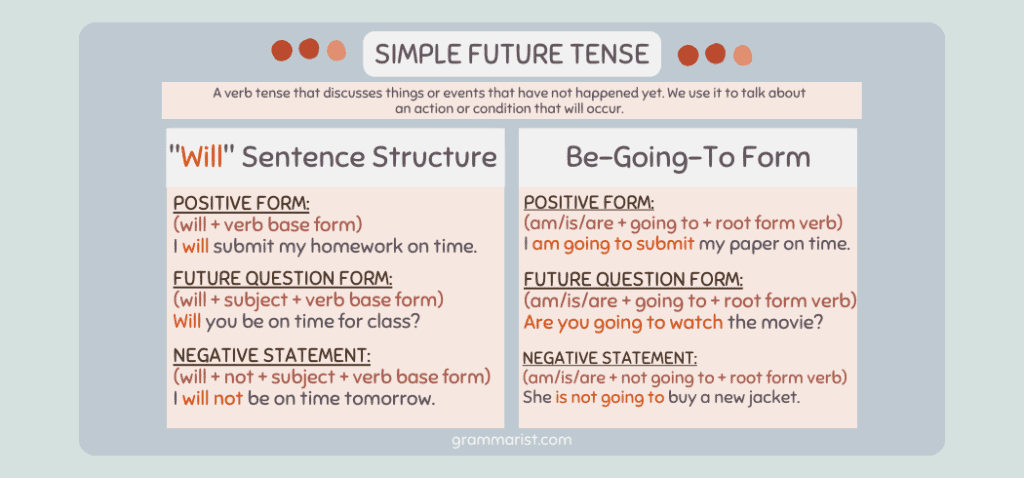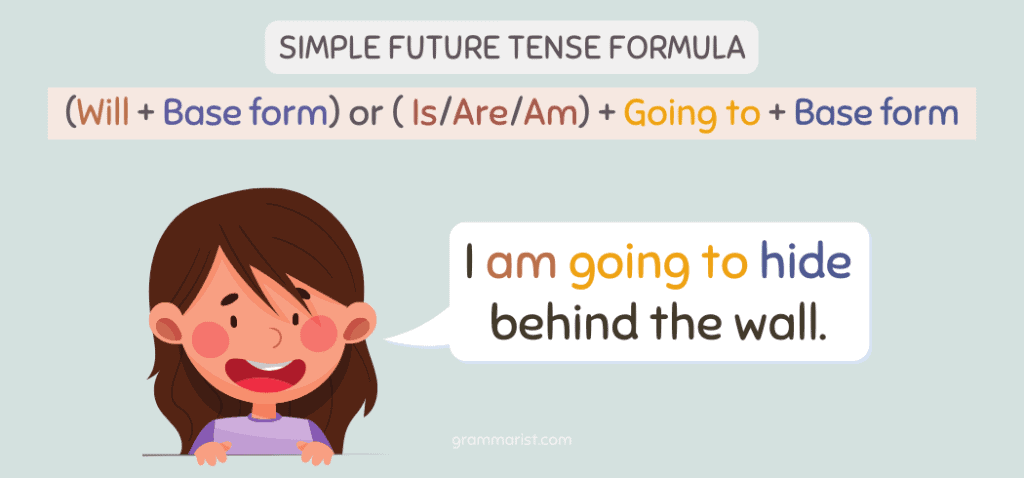The simple future tense allows us to talk about things that haven’t occurred yet. Whether it’s a promise, prediction, or plan, we know it’s yet to happen. I use it all the time in writing.
Read on for my detailed explanation of the simple future tense. I’ll explore its various forms, rules, and how to use them in sentences.
What is the Simple Future Tense?
In English grammar, the simple future tense is a verb tense that discusses things or events that have not happened yet. We use it to talk about an action or condition that will occur. You may also use it to show the fact that something will exist. Here, I’ll give you an example:
- The repairman will remove the pipes.
When expressed in negative form, the simple future tense shows that the verb denies something about the subject. Below is an example of a negative sentence.
- The repairman will not remove the pipes.
The simple future tense has three primary uses. First, it can express a voluntary action that someone will do. You can also use it to make a promise, make predictions, and express a plan.
What are the Types of Simple Future Tense?

Aside from affirmative and negative, the simple future tense is divided into two other groups depending on the form of verb. These forms can also be used in creating prediction sentences.
Will Sentence Structure
The will sentence structure of the simple future tense is made of will + base form of the verb. This is also called the casual form or common verb form of simple future tense.
But for interrogative forms or questions, the structure is inverted. The sentence starts with the will + subject + base form of the verb. Add not for negatives. I’ve got some examples for you:
- Positive form: I will submit my homework in time.
- Future question form: Will you be on time for class?
- Negative statement: I will not be on time tomorrow.
Be-Going-To Form
The conjugated form of this type of simple future tense is the auxiliary form am/is/are + going to + root form verb. This form still shows that an action will occur at a future period in time. Question sentences are indicated by starting with the auxiliary verb.
Here are some examples of sentences.
- Positive: I am going to submit my paper on time.
- Future question form: Are you going to watch the movie?
- Negative statement: She’s not going to buy a new jacket.
Rules for Using the Simple Future Tense
I’ve got a few rules to consider when producing a sentence in the simple future tense.
Conjugation Based on Point of View
Whether you’re using 1st person, 2nd person, or 3rd person, the simple future form of a verb is always will + base form or going to + base form. For example:
- I will submit the lessons by email newsletter.
- You will submit the lessons by email newsletter.
- She will submit the lessons by email newsletter.
Time Expressions
You can use several time expressions in different forms of the future tense. Some of these time expressions include:
- Next week/Sunday/month/year.
- Tomorrow.
- In two weeks/months/years.
- The day after tomorrow.
- Later.
- Someday.
Here are some example sentences in the future tense with different time expressions.
- A person will come tomorrow to accompany you.
- I am going to read the email later.
Adverb Placement
The placement of grammar adverbs like always or never are in between will and the base form of the verb.
- You will always be famous.
- She will only turn six this year.
Passive Voice
When writing passive sentences, I suggest putting the verb to be in the simple future (will be or is/are going to be) and the participle form of the verb. For example:
- A building will be built on this street.
Which Form is Used to Express the Simple Future Tense?

The correct forms to express the simple future tense are:
- Will + base form.
- is/are/am + going to + base form.
Here are more examples of simple future tense sentences.
- We will finish the preparations tonight.
- I am going to hide behind the wall.
What is the Future Tense of Is?
The simple future tense of the verb is is will be. For example:
- Present tense: She is a doctor.
- Future tense: She will be a doctor.
Final Word on Simple Future Tense
My handy article has shown you the simple future tense’s meaning, forms, and examples. This verb tense expresses future action, predictions, plans, and promises. I hope it helped you better understand.
Whether you produce casual writing or formal writing, you will always encounter the simple future tense. Its grammar rules are relatively easier than other verb tenses. All you have to do is use will + base form of the verb. Good luck!